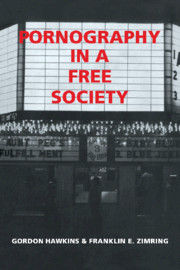Book contents
- Frontmatter
- Contents
- List of tables and figures
- Preface
- Acknowledgments
- I Pornography and the pornography commissions
- II Public policy after liberalization
- Introduction
- 6 Pornography and the subjugation of women: the radical feminist challenge
- 7 Pornography and child protection
- 8 Pornography in perspective: social response in the noncensoring society
- 9 Notes toward the future
- References
- Index
7 - Pornography and child protection
Published online by Cambridge University Press: 21 October 2009
- Frontmatter
- Contents
- List of tables and figures
- Preface
- Acknowledgments
- I Pornography and the pornography commissions
- II Public policy after liberalization
- Introduction
- 6 Pornography and the subjugation of women: the radical feminist challenge
- 7 Pornography and child protection
- 8 Pornography in perspective: social response in the noncensoring society
- 9 Notes toward the future
- References
- Index
Summary
On one question commissions on pornography are simultaneously unanimous and unhelpful. It is generally agreed that children constitute a special case in relation to governmental policy on pornography. Yet, until the Meese Commission, little time or space was devoted to exploring the special character and requirements of policy toward children.
There is very little in the Johnson Commission's report, which notes that “a large majority of sex educators and counselors are of the opinion that most adolescents are interested in explicit sexual materials, and that this interest is a product of natural curiosity about sex” (U.S. Commission, 1970:29). The commission took “the view that parents should be free to make their own conclusions regarding the suitability of explicit sexual materials for their children” (U.S. Commission, 1970:57); and, as we shall see, it appears to have regarded the use of children as the subjects of pornography as not a serious problem. Only about 4 out of 270 pages in the Williams Committee's report (Home Office, 1979:88–90, 123–124, 125–126, 131–132) deal with the topic of children as consumers of, or participants in, pornography.
The Meese Commission has two contributions on child pornography. A 14-page treatment of the problem in Part II of the report is followed in Part III by a 140-page listing of recommended law enforcement and victim aid responses (U.S. Department of Justice, 1986:405–418, 595–735). This long chapter will be discussed in the next section.
- Type
- Chapter
- Information
- Pornography in a Free Society , pp. 175 - 197Publisher: Cambridge University PressPrint publication year: 1989
- 2
- Cited by

